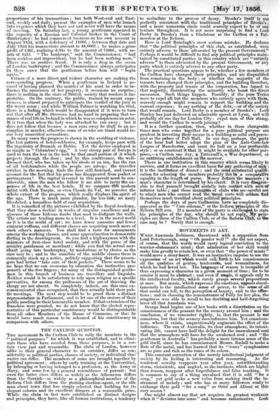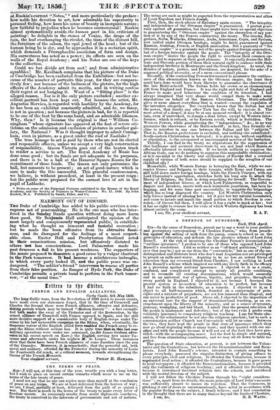MOVEMENTS IN ART.
WHEN Anastasia Robinson' threatened with a separation from Lord Peterborough, sang " Oh ponder well !" she did not expect, of course, that the words would carry logical conviction to the warrior-statesman's mind ; that admiration of her skill would make him greedy to retain her, or even that " the power of music " would move a stony heart. It was an instinctive impulse to use the expression of an art which would callstorth to his consciousness all the qualities of genius, tenderneres, and womanliness, for which he had loved her. The language of reason is incapable of thus expressing a character in a given moment of time ; for to be concise it must be abstract ; and even if maple, it appeals only to the intellectual faculty, which rarely grasps several propositions at once. But music, which expresses the emotions, appeals simul- taneously to the intellectual sense of power, to the sense of all that sound can tell, to the perception of beauty, and to the affec- tions • and in choosing the remonstrance of Polly for her plea, the songstress was able to recall to her doubting and half-forgetting lover all that Anastasia was.
George Sand begins one of her books with a dissertation on the consciousness of the peasant for the scenery around him ; and the conclusion, if we remember rightly, is, that the peasant is not conscious, but that the scenery does influence him. Yet conscious- ness, where it exists, unquestionably augments the effect of the influence. The sun of Australia, its clear atmosphere, its intoxi- cating life, cannot have half the delight for the unawakened soul that the atmosphere will have for the awakened soul ; and "the gentleman in Australia" has probably a more intense sense of the gold itself, since he has commissioned Messrs. Rudall to make a flute of the metal, and has learned that its " tones " symphonious are as pure and rich as the tones of its colour. This constant correction of the merely intellectual judgment of society by its feeling is interesting and reassuring. As the tenderest cowslip reappears year after year, notwithstanding storm, vicissitude, and neglect, so the instincts, which are higher than reason, reappear after forgetfulness and false teaching. It is common to say of a thing unvalued that it is sold " for a song," yet gold seeks a new value from making itself the in- strument of melody ; and who has so many followers ready to exchange their gold "for a song" as Grim and Alboni at this very season ? One might almost say that art acquires its greatest weakness when it " deviates into sense" and becomes ratiocinative. Look
at Ruskin's current "Notes," • and more particularly the preface : how noble his devotion to art, how admirable his superiority to personal feeling, how keen his sense of beauty in inorganic nature ; how faithful to prejudice when he becomes controversial ! Ruskin almost systematically avoids the humanpart in his criticism of painting : he delights in the stones of Venice, the drops of the rain, the leaf overhanging the rivulet, the tints of the distant hill, the furniture of the saloon, the opal jewel of the head ; but of the human being he is shy, and he approaches it in a sectarian spirit, which demands a Prseraphaelite asceticism of form and design. His earnestness has acted as a power ; its effects are seen on the walla of the Royal Academy ; and his Notes are one of the keys tt the collection.
Could we but divide art from sect ! and from administrative squabbles ! Mr. Kaulbach complains that his picture of the Duke of Cambridge has been excluded from the Relabition: but not be- cause of the number of portraits this year, for they are compara- tively few ; nor because of the badness of the picture, for the high officers of the Academy admit its merits, and in writing confess their regret at not hanging it. Want of a <' fitting place" is the alleged reason. Nor.is it the only picture excluded ; another ex- cellent portrait has been kept out. Not because the artist, Mr. Augustus Hervieu is regarded with hostility by the Academy, for lie has been an exiibiter constantly admitted, and he, we fancy, is not in question; not because the picture is bad, for it is reported to be one of the best by the same hand, and an admirable likeness. Why, then? Is it because the original is that " William Co- ningham whose signature has ;appeared at the foot of severe cri- ticisms on the admission and exclusion of pictures in another gal- lery, the National ? Was it thought improper to admit Coning- ham, even in picture, as a guest under the roof of Eastlake ?
. The true homage to art is paid by those who are not its elected and responsible officers, unless we accept a very high construction Of reliponiibility. Queen Victoria goes out of the beaten track to render a service to art. The Royal Academy of Music has done some good ; but its funds are not adequate to its purposes, and there is to be a ball at the Hanover. Squire Rooms for the recruitment of those funds. The Queen not only patronizes the ball, but consents to be present ; ' an act of good-nature which is sure to make the fête snecesiful. This graceful condescension, we believe, is without preeedent, at least in the present reign: but the public were prepared for the earnest love of art in the pupil of 1..4bLache.
Notes on some of the Principal Pictures exhibited in the Rooms of the Royal Academy, and the Society of Painters in Water-Colours. No. II. 1856. By John Ruskin, M. Published by Smith, Elder, and Co.



























 Previous page
Previous page